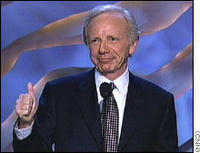Say it ain't so Joe? You supported Michael Brown's nomination?
 I think Senator Lieberman has alot of explaining to do.
I think Senator Lieberman has alot of explaining to do.From the Hartord Courant
Michael D. Brown, relieved of his hurricane relief duties Friday, didn't get much scrutiny from the Senate at a 2002 confirmation hearing.
The head of the Federal Emergency Management Agency appeared before the Senate Governmental Affairs Committee, then chaired by Sen. Joseph I. Lieberman, D-Conn., when he was nominated as the agency's deputy director. The polite 42-minute hearing attracted only four senators, and before it was over, Lieberman offered his support.
Since Katrina struck last month, Brown has been under fire - and the target of angry Democrats who want him to resign - because of his performance in getting aid to storm victims.
His resume has also been questioned. Time Magazine reported Thursday that Brown's FEMA biography says his previous emergency management experience was "serving as an assistant city manager with emergency services oversight."
But when Brown was an assistant to the city manager of Edmond, Okla., in the late 1970s, he was "more like an intern," with no supervisory authority, Time said.
Brown, who is being replaced by Coast Guard Vice Adm. Thad W. Allen, is not resigning, and administration officials maintain they are not dissatisfied with him.
Homeland Security Secretary Michael Chertoff told reporters Brown "has done everything he possibly could to coordinate the federal response to this unprecedented challenge," the Associated Press reported.
But bloggers on Friday suggested that Lieberman could have learned three years ago that Brown might not be up to such a task. An online debate began late Thursday when Juliette N. Kayyem, a lecturer in public policy at Harvard University's John F. Kennedy School of Government, posted an account of Brown's June 19, 2002, confirmation hearing.
Titled "42 Minutes of Shame," she described how "Mike Brown suffered 42 breathtaking minutes of serious nothingness (unless Lieberman's withering questioning regarding whether Brown would sufficiently keep the Senate informed - duh, yes) to become deputy director of FEMA."
The posting triggered a barrage of comments from bloggers pro and con. Lieberman said Friday in an interview that while "you can always look back," the hearing "was very much like most hearings for nominees at that level."
At the time, Brown, an Oklahoma attorney, was general counsel at FEMA. He got the same kind of quick hearing given to most people nominated to such second-tier posts. Sens. Wayne Allard, R-Colo., and Ben Nighthorse Campbell, R-Colo., introduced Brown and talked about how FEMA helped with recent wildfires in his state.
Brown, Campbell said, had been there "steadfastly and tenaciously" to help. Before Brown began speaking, Lieberman told him, "Mr. Brown, you're off to a good start. Two strong statements of endorsement."
Lieberman talked about FEMA's expanding role, how the disaster relief agency has "got to prepare for and respond to terrorist attacks at home." He quizzed Brown about whether the new mission would find FEMA continuing to maintain its network of strong contacts with state and local officials.
"We've already started down that path," Brown said. "Our partnership has to be with all agencies responding to disasters, all first responders."
Lieberman told him, "That's a good answer."
He spent 8 minutes asking Brown a series of questions, including one on chemical and biological preparedness. "Regardless of the cause of the disaster," Brown assured him, "our response is the same."
Later in the hearing, Lieberman returned for a new round of questions, notably one about preparedness in Connecticut in case of a disaster at a nuclear facility.
Brown said FEMA's role was "a very serious one," and he pledged to look closely at evacuation plans to make sure they were adequate.
Such replies were adequate for Lieberman, who told Brown at the end of the hearing, "I certainly will support your nomination."
Brown became FEMA director in early 2003, and did not have another confirmation hearing. Under legislation pushed by the Bush administration, it was not needed because his new position was germane to his old one.
"I wish there had been a hearing," Lieberman said Friday, and recalled how he wanted more scrutiny of the new FEMA head before he took office.
A hearing? Why didn't you ask harder questions when you had him for 42 minutes? Didn't you go over his resume? It onloy took TIME magazine a few days to uncover Brown's lies in his resume, how did this get past you?
There will be alot of finger pointing at who dropped in this crisis and plenty of blame needs to go to Lieberman and the other sentators who supported Brown's nomination. How he could of supported a person who had no disaster experience to the head of FEMA post 9/11 is simply amazing.















<< Home